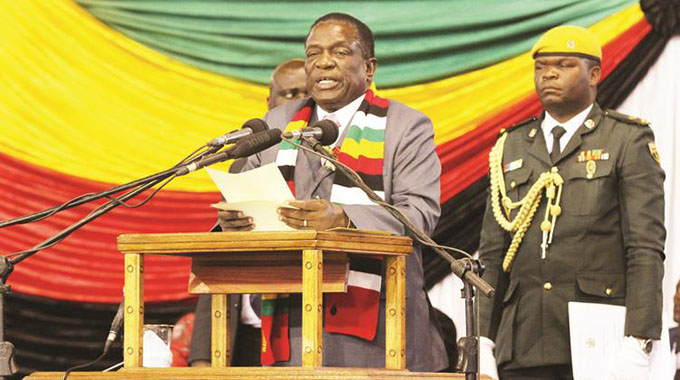ED willpower transforms Zim

Fidelis Munyoro Chief Reporter
President Mnangagwa’s willpower has transformed the country through implementing various reforms, opening up the economy for business and international re-engagement is now bearing fruit, with the Western powers acknowledging the progress made so far, according to the influential London-based journal EU Today.
Martin Banks, a highly valued contributor to EU Today, notes in an article published by the magazine that among the key reforms is the Freedom of Information Bill that will repeal the Access to Information and Protection of Privacy Act which was often viewed as stifling media freedom.
Banks cited another reform as the Government’s revising of the Public Order and Security Act that will be succeeded by the Maintenance of Peace and Order Bill.
Government has also initiated the process of compensating white former commercial farmers following the fast track land reform. Banks said the fiscal discipline instituted by Finance and Economic Development Minister Professor Mthuli Ncube was a positive development that had seen Government managing a surplus in just six months.
“All these reforms take time, but they are necessary for the EU and US to lift long-standing sanctions,” says Banks. “The IMF (International Monetary Fund) appeared pleased, stating recently that “significant economic reforms were underway in Zimbabwe.”
President Mnangagwa has introduced many other sweeping economic reforms and international re-engagements, taking the mantra: “Zimbabwe is open for business” across the globe.
Banks extols President Mnangagwa for honouring his pledge to change the country’s political and socio-economic landscape. He commended President Mnangagwa for introducing the Political Actors Dialogue and reviving the Tripartite Negotiating Forum.
“To push through these reforms, the (President) Mnangagwa government has taken significant steps towards unity and reconciliation, reaching out not only to the opposition with the so-called Political Actors Dialogue initiative, but also to labour and businesses with the Tripartite Negotiating Forum, aimed at shaping policy and binding legal agreements on social issues that affect production and labour,” says Banks.
He continues: “(President) Mnangagwa also directly addressed the opposition leader of the MDC Alliance, Nelson Chamisa, tweeting post-election that his ‘door is open’. However, Chamisa has refused any collaboration so far and instead called for continued protests. The EU, meanwhile, supports the dialogue platform, maintaining it must be made on equal footing and discussions must be frank through a free exchange of views.”
Banks says the recent EU-Zimbabwe dialogue held in Harare was long-overdue and an important step that could eventually lead to the resumption of financial aid for Zimbabwe.
“Relations between Zimbabwe and the EU were frosty throughout most of Robert Mugabe’s 37-year reign, which was marred by corruption, economic mismanagement and human rights abuses,” he said. “President Emmerson Mnangagwa has vowed to transform the country, implement reforms and open the country for business, in order to woo foreign — and increasingly, Western — investors.
“It is a noble undertaking, but Western leaders are keen to see concrete results quickly, a difficult task following nearly four decades of Mugabe misrule, which ruined the country. Nevertheless, progress is beginning to show.”
President Mnangagwa, says Banks, is clear on the long term goals and that differing positions held by protagonists must be permissible, but that “these must never divide us or result in conflict. Violence must never be used as a tool to gain temporary advantage at the expense of the people we must serve and protect”.
“Slowly but surely, (President) Mnangagwa’s actions are bearing fruit,” says Banks. “Leaders across Africa have called for the removal of sanctions, which would dramatically ease Zimbabwe’s economic burden.
“And even US ambassador Brian Nichols sounded positive in a recent radio interview, talking about “a solid plan moving forward, no doubt about it”.
“President Mnanagwa has set a target of Zimbabwe growing from being a low-income to an upper middle income economy by 2030, that will result in the standards of living drastically rising.”











Comments